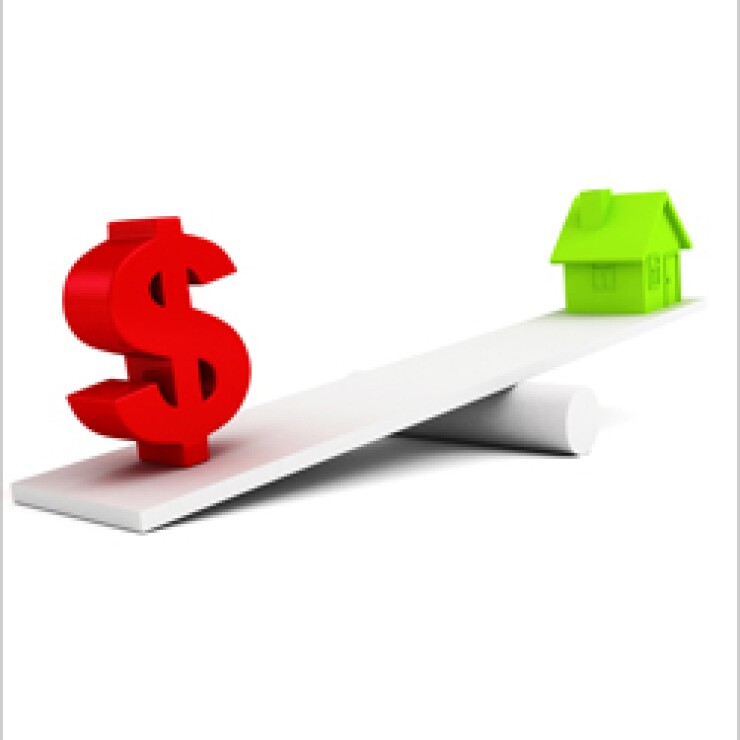
Homeowners choose not to refinance their mortgages for any number of reasons. But when they don't, they lose out on tens of thousands of dollars in savings.
Exactly how much they lose depends on each borrower's individual circumstances, but a first-of-its-kind study attempts to quantify what people forfeit by not turning in their old loan rates for lower ones.
Researchers found that the median household, having failed to refinance, gave away $45,000 in savings over the life of its mortgage. The study — by Benjamin Keys and Devin Pope from the University of Chicago, and Jaren Pope of Brigham Young University — also found that the mistake of not refinancing is widespread.
Based on a sample of 1.5 million single-family mortgages that were active in December 2010, they estimate that 1 in 5 borrowers — that is, roughly 300,000 families — had not refinanced when it appeared profitable to do so.
The findings "suggest that the size and scope of the problem of failing to refinance is large," the researchers said. "While much of the savings a household can receive by refinancing represents a transfer of wealth from investors to households, the foregone savings is clearly significant for each individual household."
Even when controlling the sample for the often-valid reasons borrowers have for sticking with their higher-rate loans, Keys, Pope and Pope found that the losses were just as great, if not more so.
The justifications people have for not refinancing are almost as varied as the borrowers themselves. One factor is that calculating the financial benefit — or loss — is relatively complex. Another is that the benefits are not always immediate, but rather accrue over time.
But other factors often are at play. Refinancing can be expensive, often requiring cash out-of-pocket to cover a number of upfront costs.
Sometimes borrowers don't believe the refinancing offers they receive are legitimate. Some don't even open letters from lenders, thinking what's inside is some sort of scam.
In other instances, the borrower's balance is so low that refinancing is seen as not worth the trouble. In other cases, they no longer have the good credit necessary to win approval from lenders. And in yet other cases, they might owe more than their houses are currently worth, meaning they'd have to bring large amounts of cash to the table to gain lower rates.
Absent these factors, though, the authors say, "there are serious consequences for homeowners if they fail to take advantage of refinancing options when interest rates decline."
The typical active loan in the sample was paying 5.52% in interest, had 23 years remaining and an unpaid balance of just over $200,000. The average loan-to-value ratio was 74%.
The authors estimate that over 91% of the households in the full sample would benefit from refinancing — a percentage they admit is dramatically overstated, since it doesn't allow for homeowners who were planning on moving, those who kept their original loans for tax purposes, and other factors. Allowing for those factors, the researchers calculate that 41% of the full sample was in a position where they should have refinanced.
Narrowing the sample even further by weeding out people whose credit scores had declined, whose loan-to-value ratios had increased, and/or who had missed or been late with a mortgage payment reduced the number who should have refinanced to 31%. And after removing households that had taken second liens against their properties, the sample was still 20% of households in December 2010 who were missing an important financial opportunity.
Worse, perhaps, is that 4 out of 10 of those people were still living in their homes two years later, continuing to make the full and on-time monthly payments, even though rates had continued to decline.
Take a household with a 30-year, fixed-rate loan of $200,000 at 6.5% at origination. When rates declined to 4.5% between 2008 and 2010, the savings by refinancing over the life of the mortgage is more than $80,000, even after accounting for transaction costs.
When rates reached all-time lows in late 2012, they had dipped to 3.35%. So someone with a contract rate of 6.5% would save roughly $130,000 by refinancing.
Lew Sichelman is an independent journalist who has been covering the housing and mortgage markets for more than 40 years.




